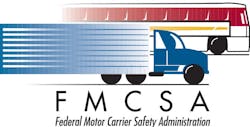FMCSA finds scant evidence of carriers harassing drivers with ELD data
Based on the findings of a research paper released today, it seems unlikely the Federal Motor Carrier Safety Administration (FMCSA) will be issuing a rule aimed at preventing motor carriers from using Hours of Service information logged electronically to “harass” their truck drivers.
The paper, "Attitudes of Truck Drivers and Carriers on the Use of Electronic Logging Devices and Driver Harassment," was announced via a Notice of Availability of Research placed in the Federal Register under Docket No. FMCSA-2010-0167.
The research was conducted as part of the agency’s previously announced intention to address the potential harassment of truck drivers once the use of electronic logging devices (ELDs) is mandated.
FMCSA described its survey as “an effort to further address the potential for harassment associated with ELDs [Electronic Logging Devices]” and said conducting it was “consistent with the agency's discussion of harassment in the ELD SNPRM [Supplemental Notice of Proposed Rulemaking]” that it issued back on March 28th.
The agency explained that it surveyed truck drivers on “their attitudes regarding carrier harassment and also looked into whether reported harassment varied by the Hours-of-Service logging method used by drivers” as part of its charge to “consider the potential for driver harassment with respect to ELDs.”
But in today’s notice, FMCSA advised that its research showed that “few truck drivers feel as if they are harassed, regardless of the method used to log their HOS.
“Generally, the research observations do not suggest that harassment is greater for drivers who use ELDs to log HOS than it is for drivers who use paper,” the agency added.
Perhaps intending to leave the door open at least a crack to a future rulemaking in this area, FMCSA also noted that the “incidence of harassment may be too rare to be detected” in the sort of research it carried out.
“There are statistically significant differences, but they are rare among the many comparisons made, and one could legitimately conclude that those statistically significant differences are such a small proportion of all the comparisons made that their rising to the level of ‘statistical significance’ is due to chance or sampling error,” the agency pointed out.
FMCSA also remarked that when it asked drivers about “other interactions which they might have experienced at their company,” those using ELDs “indicated a greater likelihood that they were (1) asked why their truck had not moved or (2) that their carrier had changed their logs.”
The agency wrapped up its report by stating that the “evidence in this survey research does not support concluding that harassment occurs due to being in a situation where HOS are logged using ELDs.”
The public comment period for this Notice of Availability of Research (Docket No. FMCSA-2010-0167) runs for 30 days.
